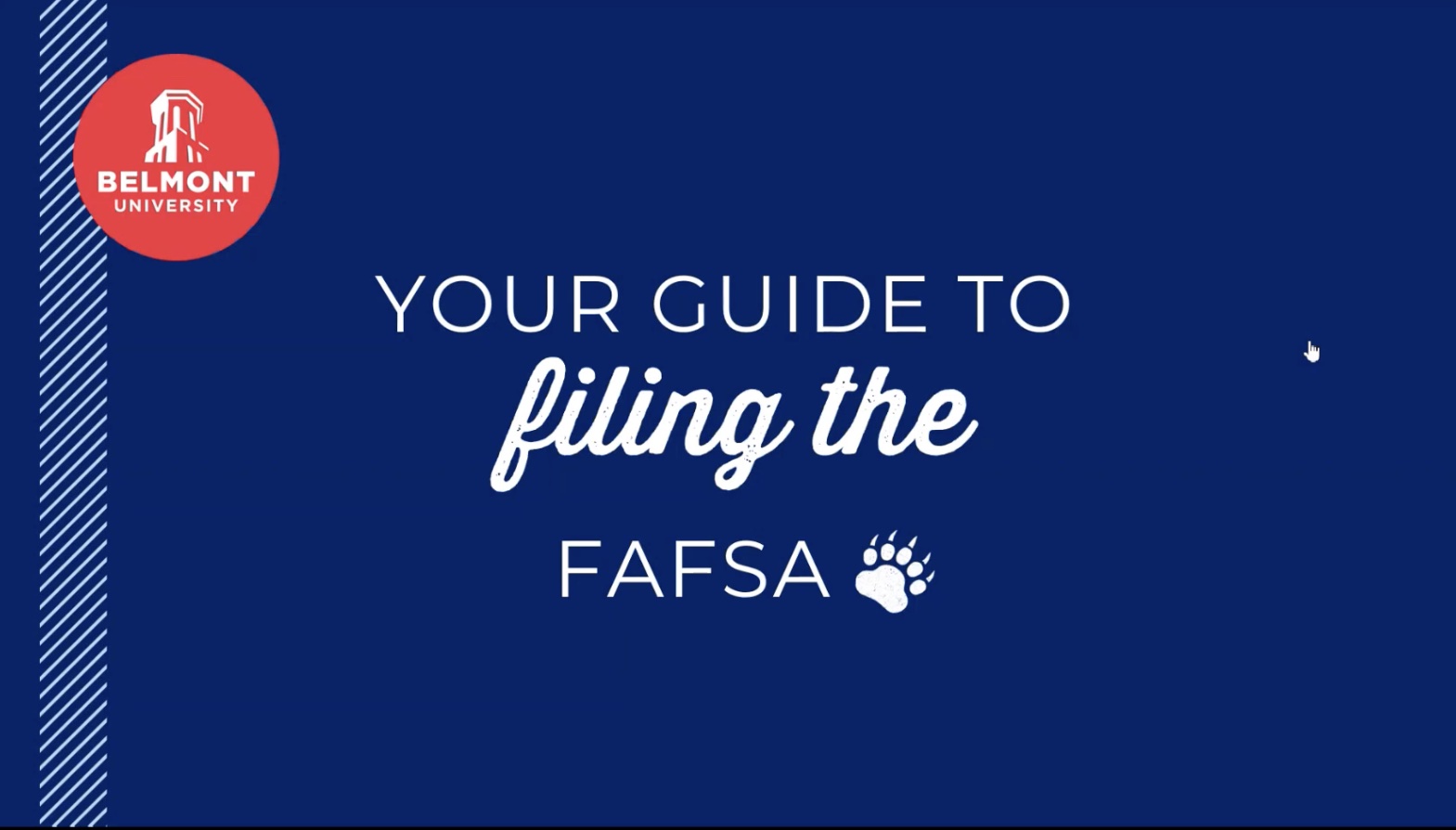We understand that navigating the financial aid process can be a bit overwhelming. We're here to help. If you need help, reach out to our Financial Aid Office at finaid@belmont.edu.
FAFSA Webinar
The Free Application for Federal Student Aid (FAFSA) is an essential part of the college application process. It determines a student's eligibility for financial aid, including grants, loans and work-study programs. However, for many parents, the process can be confusing and overwhelming, especially if it's their first time going through it.
For 2026-27, there are important changes you need to know. The FAFSA is open, and Belmont's priority deadline is Dec. 1, 2025.
Three key things to remember:
- Students (not parents) must start the application
- Both student and parent need their FSA-ID ready before beginning, and
- Each question should be read carefully as wording can be interpreted differently.
If you need help, our Student Financial Services office is available here, or you can reach the FAFSA help desk at 1-800-433-3243 for technical support (they also have live chat).
Here are a few common questions and some specific things to keep in mind this year.

FAFSA QUICK FACTS
What is FAFSA?
FAFSA is an application provided by the federal government to determine a student's eligibility for financial aid. The application is used by colleges and universities to determine how much financial aid to award to a student.
Three Essential Requirements for 2026-27
- The student must start the FAFSA process, not the parent
- Both student and parent need their FSA-ID ready before starting
- Read each question carefully, as the wording can be interpreted differently
How do you complete the FAFSA?
The FAFSA application is available online at StudentAid.gov, and it's free to complete. Belmont has a guide you can access here for step-by-step instructions.
Here's what you need:
- Student FSA-ID (create this first)
- Parent FSA-ID (Parents that are married and filed taxes jointly can use one FSA-ID, if taxes were filed separately both parents will need an FSA-ID)
- 2024 tax information
- Accurate personal and financial information
What types of financial aid are available through FAFSA?
FAFSA determines eligibility for:
- Federal grants
- Scholarships
- Work-study programs
- Federal loans Each type of aid has specific terms and conditions you'll need to understand before accepting.
What happens after submitting the FAFSA?
After submission:
- You'll receive a Student Aid Summary within a few days
- Review this summary carefully for accuracy
- Your Student Aid Index (SAI) will help determine aid eligibility
- Aid packages will be communicated through:
- Prospective Students: Slate
- Current Students: myBelmont email
Key Changes for the 2026-27 FAFSA
The FAFSA process continues to evolve. Here are the most important things you need to know for 2026-27:
Aid Package Communication Updates
- Prospective Students: Will receive information through Slate
- Current Students: Will receive updates via myBelmont email
PARENT QUESTIONS
Annual FAFSA Application Clarification
"If we completed the FAFSA for the fall semester of 2026, is it necessary to submit another application for the spring semester of 2027, or does the initial application cover the entire academic year?"
Once you've completed it for an academic year, you're covered for the fall, spring and summer semesters of that year. So, no need to reapply for the spring semester if you've already done so for the fall of the same academic year. REMINDER: You must complete a FAFSA each year to determine financial aid eligibility.
FAFSA Crash Course for Parents
"As a parent of a junior soon to be a senior, where can I find a simplified guide or 'crash course' on the FAFSA process to ensure I'm well-prepared to assist my child?"
A good starting point is the official Federal Student Aid website, which offers a step-by-step guide and resources for first-time applicants. Belmont also offers a FAFSA Weekly Update Video Series. Contact your admissions counselor for details.
Clarification on Investments in FAFSA
"In completing the FAFSA, we found some sections, particularly regarding investments, a bit confusing. Could you provide clearer guidelines on what types of investments need to be reported and which ones should be excluded?"
The FAFSA does attempt to guide applicants through the process, but there's always room for improvement, especially regarding investment reporting. The Federal Student Aid website and the FAFSA help line are useful resources when in doubt about specific sections.
Student and Parent Access to Financial Information
"Does a student’s FAFSA login provide access to all the financial information entered by the parent, or is there a way to restrict this access to maintain privacy?"
Generally, students will have access to the entire FAFSA application, including the financial sections, once they log in with their FSA ID. It's designed this way to facilitate transparency and collaboration in completing the application. The student will also invite the parent(s) to complete their portion of the FAFSA once the student section is completed.
Technical Difficulties with FAFSA Submission
"We've encountered persistent technical issues when trying to submit the FAFSA, particularly when transitioning from the student's section to the parent's. What steps can we take to resolve this, and is there a direct line for technical support?"
Keep trying at different times of the day, particularly during off-peak hours. If the issue persists, reaching out directly to the Federal Student Aid Information Center for assistance.

A Guide for Different Family Situations
- Whose Information to Include: FAFSA will guide the student through a series of questions via the “Parent Wizard” to determine which parent's financial information is required.
- Remarriage Considerations: If the custodial parent is remarried, the stepparent's financial information must also be included on the FAFSA.
- Communication Is Key: Coordinating with your ex-spouse can ensure consistency in the information provided, especially regarding child support and other financial arrangements.
- Income Reporting: Only the income and financial information of the single parent will be required on the FAFSA.
- Child Support and Benefits: Any child support received, as well as government benefits, should be accurately reported on the FAFSA.
- Joint Contribution: The FAFSA requires the combined financial information of both parents. This includes income, taxes paid and assets.
- Reporting Accuracy: Ensure that all information, including taxes and assets, is reported accurately to avoid discrepancies that could affect the aid amount.
- Parents that are married and filed jointly can use one FSA-ID to complete the FAFSA, but if the parents are married and filed separately, both parents will need to create an FSA-ID.
- Determining Independence: You’re considered an independent student if you’re 24 years old, married, a graduate student, a veteran, a member of the armed forces, an orphan, a ward of the court or have legal dependents other than a spouse.
- Financial Information: Independent students only need to provide their own financial information (and their spouse’s, if married).
- Active Duty and Veterans: Active duty and veterans' benefits are treated differently in FAFSA. It's crucial to correctly report your status and benefits received.
- Special Circumstances: If your financial situation has recently changed due to deployment or change in duty status, you can contact the financial aid office to explain these changes, which might not be reflected in the standard FAFSA application.
- Who to Include: In blended families, if the student's legal parent is remarried, the stepparent's financial information must be included alongside the parent’s. This is regardless of any prenuptial agreements stating otherwise.
- Children from Previous Marriages: If there are children from previous marriages, their financial support details need to be reported accurately, especially if they impact the household's overall financial situation.
Reporting Each Student: Each college-bound child must complete their own FAFSA application. It's important to ensure consistency in the reported parental information on each application.
- Guardian vs. Parent: If the student is under legal guardianship but not adoption, the guardians' income may not need to be reported. In such cases, the student might be considered an independent student.
- Legal Documentation: It’s crucial to have proper legal documentation regarding guardianship or foster care status, as this can significantly impact the FAFSA process.

Understanding Financial Aid Terms
- Student Aid Index (SAI): The Student Aid Index (SAI), it's a measure of a family's financial strength and is used to determine eligibility for federal student aid.
- Cost of Attendance (COA): This includes tuition, room and board, books, supplies and other educational expenses. Understanding COA can help in assessing the total financial requirement for college.
Deadlines and Timing
- FAFSA Deadline: Be aware of the federal deadline, as well as any state or institutional deadlines, which may vary and can be earlier than the federal deadline.
- Early Application: Applying early can be beneficial, as some types of aid are awarded on a first-come, first-served basis.
Documentation and Information Required
- Tax Information: Having tax returns, W-2s and other income information readily available can simplify the process.
- Assets and Investments: Understand what counts as assets and investments, including savings accounts, real estate (excluding the family home) and other investments.
Special Circumstances
- Professional Judgment: In cases of special circumstances (like a job loss, medical expenses, etc.), the financial aid office may use professional judgment to adjust the financial aid package.
State-Specific Aid Programs
- State Grants and Scholarships: Some states have their own financial aid programs. Eligibility for these often requires a FAFSA submission, but there might be additional applications. Check the Tennessee Student Assistance Corporation website for the most current information and guidance on applying.
Additional Forms and Applications
- CSS Profile: Some colleges require this additional form administered by the College Board for non-federal financial aid. Belmont does not require the CSS profile.
- Institutional Forms: Certain colleges may have their own forms or requirements for financial aid.
Post-Submission Steps
- Reviewing the Student Aid Summary: After submission, the results summarizes your FAFSA submission and estimates your eligibility for federal student aid.
- Verification Process: Some students are selected for verification, a process where you must provide additional tax documents to confirm the accuracy of FAFSA data.
Understanding Loan Options
- Federal vs. Private Loans: Federal loans often have more favorable terms and conditions (like fixed interest rates and income-driven repayment plans) compared to private loans.
Work-Study Programs
- Federal Work-Study: Understand if you are eligible for these programs that allow you to work part-time on campus to earn money. Work study funds cannot be applied to tuition costs.

Belmont’s FAFSA Timeline
Belmont, like many institutions, has its own specific process for handling financial aid applications, including FAFSA. Here's a general overview of what the process typically involves:
FAFSA Submission: Students and their families should start by completing the FAFSA form. Belmont University's school code, which is necessary for the FAFSA, is 003479. This ensures that the financial aid office at Belmont receives the application.
Priority Deadlines: It's important to be aware of our priority deadlines for financial aid. Submitting the FAFSA before these deadlines (for Belmont, it's Dec. 1, 2025) can increase the chances of receiving certain types of financial aid, as some funds are limited and awarded on a first-come, first-served basis.
Review by Financial Aid Office: Once the FAFSA is processed and Belmont receives the information, the University's financial aid office reviews it. This review helps determine the student's need for financial aid and their eligibility for various types of aid, including grants, loans and work-study programs.
Financial Aid Package: After the review, Belmont creates a financial aid package for the student. This package may include a combination of grants, scholarships, loans and work-study opportunities. The amount and type of aid offered can vary based on the student's financial need, academic merit and available funding.
Financial Aid Notification: Students receive a notification of their financial aid package. This notification typically comes via email or through a student portal. The package details all the financial aid elements the student has been awarded.
Accepting the Award: Students must then accept (or decline) the financial aid offered. For loans, there may be additional steps required, such as completing loan counseling or signing a Master Promissory Note (MPN).
Verification Process: Some students might be selected for verification. This process requires providing additional tax documentation to verify the accuracy of the FAFSA information. Prompt response to any verification requests is crucial to avoid delays in receiving aid.
Maintaining Eligibility: To continue receiving financial aid, students must meet certain academic standards, known as Satisfactory Academic Progress (SAP). These standards usually include maintaining a minimum GPA and completing a certain percentage of attempted courses.
Renewal: Financial aid is not automatically renewed each year. Students must reapply for FAFSA each year to continue receiving financial aid.
Special Circumstances: If a student or their family experiences a significant change in financial circumstances, they can contact Belmont’s financial aid office to discuss potential adjustments to their financial aid package.
For the most accurate and detailed information, including any recent updates or changes specific to Belmont, contact our Student Financial Services office at finaid@belmont.edu.
Next Steps
File Your FAFSA on StudentAid.gov or visit the Student Financial Services website by Dec. 1, 2025.


